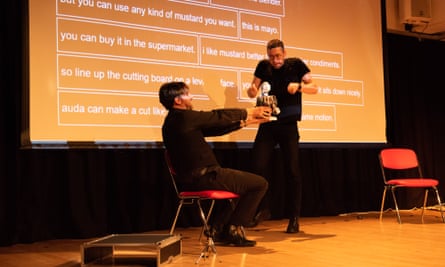
I’ve seen some bad comedy acts over the years – but not, until now, one that is part of an existential threat to humanity. One of artificial intelligence’s pre-eminent boffins, Geoffrey Hinton, sent out shock waves recently by arguing that, in relation to AI: “We’re toast. This is the actual end of history.”
That’s a hell of a backdrop to my visit to see Artificial Intelligence Improvisation, a show by the Improbotics troupe playing as part of an AI festival in London this week. You’ll forgive me, I hope, for some hesitation in wielding the critical brickbat, given that the act under review boasts the capacity to wipe out all of us.
Of course, comedy saw this coming before Hinton did – see Flight of the Conchords’ robot-apocalypse classic The Humans Are Dead. The Conchords aside, the Improbotics show – which has been doing the rounds for some years – is not operating alone in the terrain where AI meets comedy. Netflix released “the first standup comedy special written entirely by bots” in 2021, although it’s widely held to have actually been created by the writer Keaton Patti, who specialises in, er, pretending to be an artificial intelligence. As that would suggest, humour isn’t AI’s forte. One recent article noted that AI visual art and AI music have developed to a degree that often astonishes us, but “the latest wave of chatbots have yielded no equivalent laugh-out-loud watershed moment”. Some experts in the field now classify humour as we used to think of chess: a significant (maybe even out-of-reach) frontier for AI to conquer if it’s ever to measure up to human intelligence.
Why is that? Because, unlike music and visual art, comedy can’t be easily reduced to an algorithm. OK, there are programs that can independently generate basic puns and one-liners. “What kind of pig would you ignore at a party? A wild bore” – that’s the Joke Analysis and Production Engine (Jape) in action. More recently, the former David Letterman writer Joe Toplyn has made some waves with his humour software Witscript, which (unlike Jape) takes context into account when wisecracking computationally. But humour as wielded by actual people – far less professional comedians – is not just about context: it’s about context multiplied by language divided by taboo crossed with tone of voice and all mixed to a heady broth of playfulness, intention, body language, allusion and much more besides. AI can’t touch it.
The Improbotics show – or at least, the performance I saw – makes that painfully clear. Programmed as part of a festival of AI-themed theatre, it casts a chatbot called Alex alongside a five-strong troupe of human improvisers. Alex is not capable of voice recognition. What happens instead is that the show’s MC (and founder) Piotr Mirowksi feeds the other performers’ dialogue into a computer, and Alex generates phrases that can be selected in response. It’s a cumbersome process, not conducive to quickfire repartee.

Nor, particularly, to laughter. What’s interesting about Improbotics’ undertaking is that, far from seeking to demonstrate AI’s sophistication, it trades on precisely the opposite. “I would like everyone to take a deep breath,” says Mirowksi when introducing the show, “and … lower your expectations.” The joke here is that Alex’s contributions are not clever, not well integrated into the dialogue, nor funny in any designed way. They are, to varying degrees, non sequiturs, ill-fitting phrases clunkily inserted into one scene after another. “Our hilarious challenge,” runs the blurb, “is to attempt to justify, physically and emotionally, AI-generated lines that may make no sense at all.”
Alas that challenge went unmet on stage this week, which might be ascribed more to the improvisers than to the robot in their midst. Whether Alex itself, all 12 mechanical inches of it, participated in the scenes (pitching a movie to a producer, introducing a boyfriend to one’s parents, and so on), or whether its lines were fed via earpiece to a performer, these scenarios remained leaden and uninspired, with never any sense that Alex’s input was affecting the narrative, or even throwing curveballs that were fun to try to catch.
Can humorists – and improvisers – rest easy, then, in the security of AI’s comic ineptitude? A main demand being made by striking writers in Hollywood right now is that the use of artificial intelligence be regulated, and that no AI is to be trained on Writers Guild of America members’ work. If we can imagine AI involvement in screenwriting, if only as a supplement to living, breathing talent, we can surely imagine some role for it in the world of making people laugh. But no comedians are striking yet. Perhaps the robot apocalypse is nigh – but as they poison our asses with poisonous gases, to paraphrase the Conchords’ song, I doubt they’ll be cracking any good jokes about it.